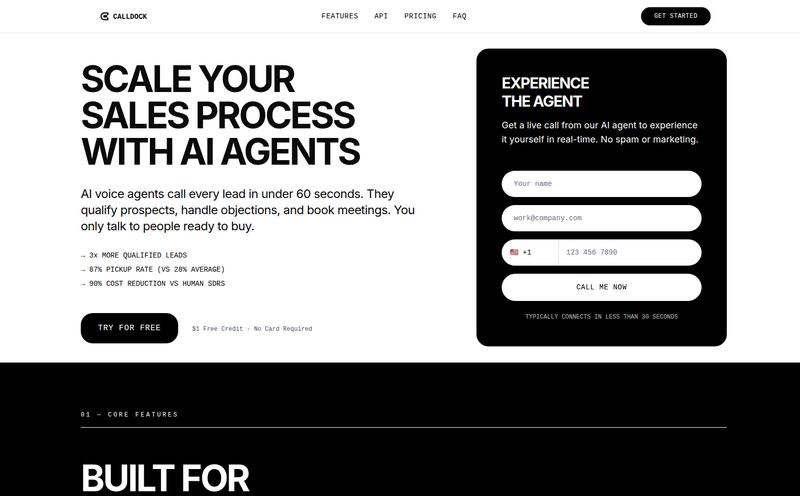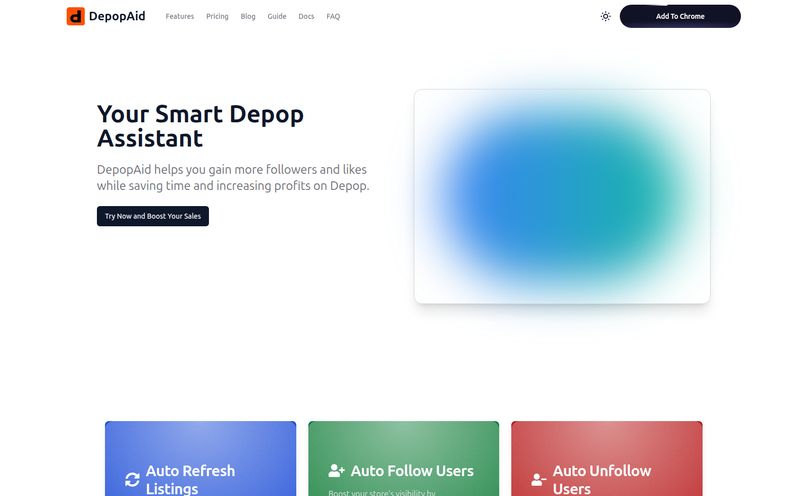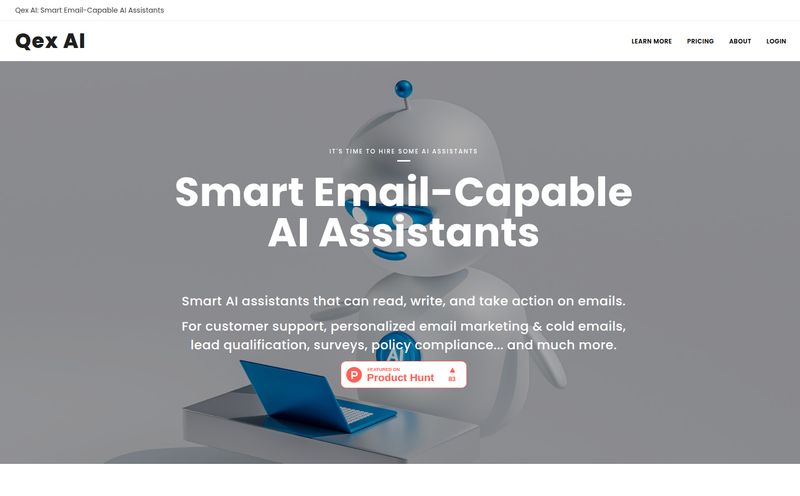How many tabs do you have open right now? If you’re anything like me, and you’re in the middle of a serious purchasing decision—say, for a new laptop or even just the perfect non-toxic face wash—the answer is probably “too many.” You’ve got three review sites, a YouTube video, the manufacturer's page, and a Reddit thread all screaming different opinions at you. It’s exhausting.
It's what I call 'purchase paralysis.' The sheer volume of information is supposed to empower us, but most of the time, it just freezes us in our tracks. For years, we've relied on primitive search filters and hope. But the winds are changing, and AI is stepping into the role of the ultimate shopping assistant. Enter Claros, a tool that claims to be an “AI product expert.” A bold claim. But I’ve been in this SEO and traffic game long enough to know that bold claims are a dime a dozen. The question is, does it deliver?
So, What Exactly is Claros?
At its heart, Claros is refreshingly simple. It’s an AI-powered product recommender. Think of it less like a search engine and more like a conversation with that one friend who is weirdly knowledgeable about everything. You know the one. The friend you’d call to ask about the best air fryer, and they’d immediately ask you about your counter space, cooking habits, and whether you prefer a basket or an oven style.
Claros aims to be that friend. Instead of you sifting through thousands of listings, you tell it what you need, what your constraints are, and what matters to you. It then goes off and does the heavy lifting, coming back with suggestions. The homepage I saw keeps it clean, with broad categories like Tech, Beauty, Health, and Toxic-free, which gives you a good idea of where its strengths might lie. It’s not trying to be the everything store; it seems more curated.

Visit Claros
How It Works in the Real World (My First Impressions)
The theory is great. But I wanted to see it in action. Let’s imagine I’m on the hunt for a new webcam. My old one makes me look like a grainy potato, and with the number of video calls I'm on, it's time for an upgrade.
Instead of typing “best webcam” into Google and starting my descent into the tab-hell I mentioned earlier, I’d turn to Claros. I'd say something like, “I need a webcam for professional video calls. It has to have great low-light performance, a wide-angle lens for my whiteboard, and be under $150.”
It’s this conversational input that’s the magic ingredient. You have to give it something to work with, of course. You cant just grunt “webcam” and expect miracles. The quality of the recommendation is directly tied to the quality of your request. Garbage in, garbage out, as they say. But if you give it good fuel, the engine can really purr. It’s supposed to cut through the noise and give you a handful of solid options that actually fit your specific, human needs. A real time-saver, if it works.
The Good, The Bad, and The AI
No tool is perfect, especially not in the wild west of consumer AI. After kicking the tires, here’s my honest breakdown of where Claros shines and where it, well, shows its wiring.
The Time-Saving Potential is Real
Let's not beat around the bush. The biggest win here is speed. The core promise is that it helps you “find better products faster,” and I have to say, the potential is enormous. For someone who values their time—and whose doesn't?—cutting down research from three hours to fifteen minutes is a massive advantage. It’s the difference between buying the thing you need and putting it off for another week because you just don’t have the energy to decide. We’ve all been there.
But It’s Only as Smart as Its Brain
Here’s the catch, and it’s a big one that applies to all AI right now. The effectiveness depends entirely on the quality of the underlying AI model. Is it pulling from up-to-the-minute reviews? Does it understand the difference between a paid promotion and a genuine user opinion? An AI is only as good as its data. I've seen AI tools confidently recommend products that were discontinued two years ago. I haven't seen that with Claros yet, but it’s a healthy skepticism to maintain. It's something to watch.
Then there’s the little matter of signing in. To track your history and remember your preferences, you need to create an account. I can almost hear the collective groan. Another password to remember. But let's be fair, this is a standard trade-off for personalization. It's how Netflix knows you love true-crime docs and how Spotify builds your perfect playlist. If you want it to remember you, you have to let it, you know, remember you.
Who is Claros Actually For?
I don't think this tool is for the hardcore hobbyist who genuinely enjoys spending a weekend comparing chipset benchmarks. They love the weeds. More power to them.
Instead, I see Claros being a godsend for a few key groups:
- Busy Professionals: People who need to buy a new printer but would rather spend their Saturday doing literally anything else.
- Overwhelmed Parents: Trying to find the best car seat without getting a PhD in safety standards? This could be a lifeline.
- Conscious Consumers: The “Toxic-free” category is a big tell. For shoppers who prioritize specific ethical or health standards, Claros can quickly filter out the noise and find products that align with their values. It's a niche that's often hard to search for effectively.
In short, it’s for the decisive shopper who knows what they want but doesn’t have the time or desire to become a temporary expert in every single product category they buy from.
What About the Cost? The Pricing Puzzle
So, how much will this AI shopping guru set you back? Here’s the interesting part: right now, it appears to be free. I couldn't find a pricing page, which in the startup world usually means one of a few things. It could be in a public beta phase, gathering user data and refining its model. Or, it could be operating on a freemium model.
The presence of an “Upgrade” button on the interface is the clue. This strongly suggests a future Pro version. What would that include? My money’s on more advanced filters, the ability to compare products side-by-side, or perhaps integration with more stores. For now, though, you can get in on the ground floor without opening your wallet.
The Bigger Picture on AI in E-commerce
Claros isn't happening in a vacuum. AI is slowly but surely weaving itself into the fabric of how we shop online. We’ve had algorithmic recommendations from giants like Amazon for ages, but they often feel clunky and impersonal. “Because you watched this, you might like that.” Sometimes it's right, sometimes it's hilariously wrong.
Tools like Claros represent the next step: conversational commerce. It’s a more active, personalized approach. It’s not just predicting what you might like based on past behavior; it's actively listening to what you need right now. This is a far more powerful paradigm, and frankly, a lot more useful. The whole industry is moving in this direction, and Claros is a neat, early example of it done well.
Final Thoughts: Should You Give Claros a Shot?
So, is Claros the revolutionary AI shopping buddy that will end 'purchase paralysis' forever? Maybe not forever, but it’s a hell of a good start. It's a clever tool with a clear purpose, and it addresses a genuine pain point that I, and I suspect many of you, feel deeply.
It’s not perfect. It will live and die by the strength of its AI. But it's one of the most promising applications of practical AI for the average person I've seen in a while. It’s focused, it's easy to use, and it has the potential to give you back one of your most valuable assets: your time. For that reason alone, I’d say it’s absolutely worth a try. Go ahead, throw a tricky product request at it. You might be pleasantly surprised.
Frequently Asked Questions
- What is Claros AI?
- Claros is an AI-powered tool that acts as a product expert. You provide your specific needs and criteria in natural language, and it recommends products that match, aiming to make the shopping process faster and easier.
- How does Claros make recommendations?
- It uses an artificial intelligence model to analyze your request and search for products that fit your criteria. The quality of its suggestions depends on the detail you provide and the sophistication of its AI.
- Is Claros AI free to use?
- Currently, Claros appears to be free to use. However, the interface includes an “Upgrade” button, which suggests that there may be a paid premium version with additional features in the future.
- Do I need an account to use Claros?
- While you can likely get recommendations without an account, signing in is required for features like tracking your search history and getting more personalized results over time.
- What kind of products can I find with Claros?
- Based on its main categories, Claros focuses on areas like Tech, Beauty, Health, and Toxic-free products. It's designed for finding specific consumer goods rather than general-purpose browsing.
- Can I trust the AI recommendations from Claros?
- As with any AI tool, it's wise to use the recommendations as a starting point. While it can significantly narrow down your options, you should still do a quick final check on the suggested products. The technology is good, but not infallible.



